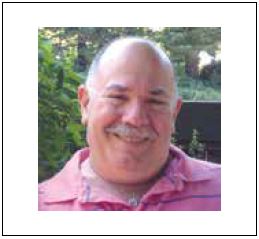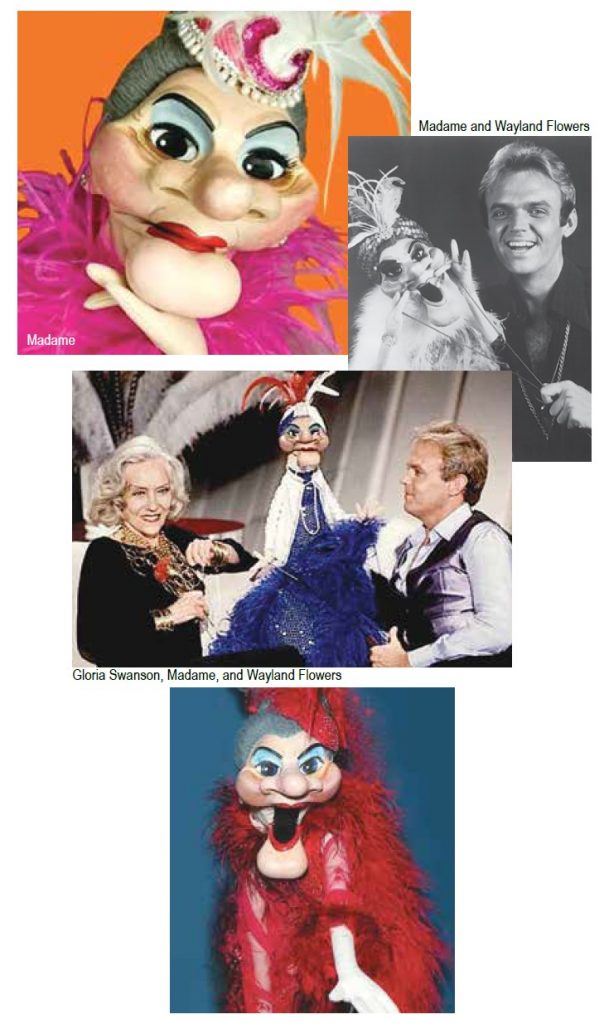
By Dr. Bill Lipsky–
She was the original cougar, long before the concept existed. She was one of very few women to host her own television show. Of unknown but seemingly advanced years, she often shocked the faint of heart with her tart, acerbic, acrimonious, and often venomous comments. She thrilled members of the gay community with a persona and a cleverness that spoke directly to them at a time when few celebrities did. She was Madame. During the 1970s and 1980s, she was everywhere.
More colorful than a paint store after an earthquake, as potty mouthed as she was potty minded, Madame let loose with memorable quips that could burn through the newsprint if they were printed here. Even on television, she let both her erotic enthusiasms and her gay sensibilities shine through. When asked by Peter Marshall, host of Hollywood Squares, “Do most women think a gambling casino is a good place to meet a man?” she answered, “I’ll lay ya eight to five … or ten to midnight.”
Panelists on the program typically answered the questions they were asked first with a clever comment—not always successfully—then with a serious one. Madame’s responses almost always came from a gay campiness, a true redundancy, and were not exactly subtle. Asked, “Is it true that people who smoke get rear-ended more often?” she replied, “Hi sailor, got a light?” The number of images that come to mind, depending on who you believe is actually speaking, is a sheer delight.
The most openly gay sensibility on television after Paul Lynde, whom she followed into the prized Center Square after Lynde left the show, Madame and her comments and quips usually left no doubt where her mind was: “Men, drinking, entertaining, and entertaining men who have been drinking.” Some believed her public persona was based upon silent film star Norma Desmond, as portrayed by Gloria Swanson in Sunset Boulevard. During an interview on Madame’s Place in 1982, Swanson denied it. Madame did, too.

Madame never stopped. After Marshall told her, “Mozart, Beethoven, Schubert, and Strauss lived in the same place,” and then asked, “Where did they all live?” Her answer: “At the YMCA!” Viewers with no knowledge of the Y’s storied reputation within the gay community may have found the response funny in itself. Gays certainly did, but for totally different reasons: their insider knowledge, their shock of hearing it on TV, and the rare pleasure of someone speaking directly to them.
Unlike many performers then, she was never coy about herself, although she believed the stories about her sex life were exaggerated. “I have only three things to say about sex,” she said. “Yes, when, and where.” She freely admitted that she’d had ten husbands: six of her own and four of her friends. Not all of her romantic experiences were happy, however, and she ended her relationship with her last boyfriend when she found out he was 27. “He told me he was 19,” she explained.
Madame’s great friend and constant companion was the openly gay Wayland Flowers. Born in Dawson, Georgia, on November 26, 1939, he began working with and creating marionettes as a child. After graduating from college, he moved to New York to pursue an acting career, but soon was designing puppets for local troupes and programs, including Captain Kangaroo. He debuted his own show, Kumquats, “the world’s first erotic puppet show,” in 1971. The next year Madame appeared in a solo lounge act in Provincetown to immediate success.
Flowers may have been out of the closet, but he was deep in the shadows. “I’m right out there on stage beside Madame, but within two or three minutes it seems that I disappear,” he said in an interview. He never appeared on Madame’s Place, her syndicated television show, which ran five nights a week from September 20, 1982, to February 23, 1983, although Debbie Reynolds, Betty White, William Shatner, Arsenio Hall, Pee Wee Herman, Charles Nelson Reilly, Phyllis Diller, and Eva Gabor did, among others.
Reading like it has the plot of a sketch from an LGBT fundraiser, Episode 35, which premiered on November 5, 1982, is actually typical. According to one synopsis, “Madame is paid a visit by her black sheep cousin Charley [played by drag immortal Charles Pierce], who transforms into Bette Davis whenever he hears the word ‘trash.'” Not gay enough? “When vacationing Pinkerton [the butler] returns to the mansion, he falls for Charley in drag.” At the time, no other television program would have attempted such an episode.
The summary simply cannot convey the camp humor of the dialogue, with its affected, faux catty delivery and its gay cultural references:
Cousin Charley: I passed your house the other day. You must have been sunbathing on the patio. Vultures were circling overhead.
Madame: Oh yes. I do remember you swooping and swirling on your broomstick spelling out the words, “Surrender Dorothy.”
Cousin Charley: Darling, that joke has been around since 1776. And so have you. Why, you gave Minute-Men a whole new meaning.
Madame: How amusing coming from someone who’s seen more ceilings than Michelangelo.
Madame retired after Flowers died of complications from AIDS-related Kaposi’s sarcoma on October 11, 1988, but remained well-remembered for glorifying the kind of brittle banter, witty putdowns, and camp cultural references that gays had enjoyed for years. Her ancient one liners and bawdy jokes, double entendres that left nothing to the imagination, and her tart responses brought their humor to a wider audience that was not expecting it and may not always have understood it, but certainly came to appreciate it, knowing its source or not.
Although many of Madame’s quips now sound overworked and all too obvious, part of the reason for their familiarity is simply that they have been repeated endlessly for the last 40 years. She endures as one of the indelible personalities of the century. Flowers, for all the time he spent in Madame’s shadow, remains one of the most visible puppeteers in current memory.
Bill Lipsky, Ph.D., author of “Gay and Lesbian San Francisco” (2006), is a member of the Rainbow Honor Walk board of directors.
Published on April 7, 2022
Recent Comments